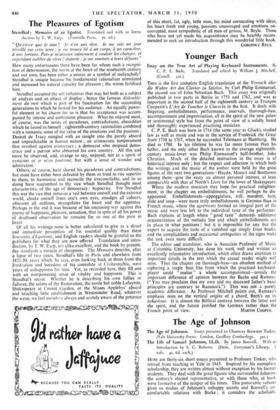The Pleasures of Egotism
" Qu'est-ce que le moi? le n'en sais rlen. le me suis un Jour reveille sur retie terre ; je me trouve lied un corps, a un caractere, d une fortune. Puis-je m'anzuser vainement a vouloir les changer, et cependant oublier de vivre ? duperie : je me soumets a leurs defauts." How many unfortunates there have been for whom such a recogni-
tion of determinism, the worm at the heart of the nineteenth century and our own, has been either a source or a symbol of melancholy!
Stendhal is unique because his fundamental rationalism stimulated
and increased his natural capacity for pleasure ; the worm fertilised him.
Stendhal accepted the self (whatever that maybe) both as a subject of analysis and an object of display ; hence the famous dedouble- merit du moi which is part of his fascination for the succeeding generations to which he looked for his audience. An equally power-
ful element in his charm for us is that his acceptance was accom- panied by intense and continuous pleasure. What he enjoyed most, of course, was the series of paradoxes, contradictions, absurdities
which he found in himself ; eighteenth-century rationalism combined
with a romantic sense of the value of the emotions and the passions ;
Destutt de Tracy mingled with an insight into the purely absurd
and unpredictable in human nature ; an aristocratic temperament
that revolted against aristocracy ; a democrat who despised demo-
cracy and a patriot who abhorred his own country. All this and
more he observed, and, strange to say,. enjoyed, not in a spirit of cynicism or je m'en foutisme, but with a sense of wonder and
admiration.
Others, of course, have shared his paradoxes, and contradictions, but most have either been defeated by them or tried to rise superior to them, to harmonise and reconcile the irreconcilable, and in so doing have succumbed to the vice which Stendhal thought most characteristic of the age of democracy: hypocrisy. For Stendhal
this was the vice that removes a veil between oneself and the external
world, cloaks oneself from one's own eyes, smudges all colours, obscures all outlines, strangulates the heart and the appetites. Perhaps in the end it was because of his unceasing war against this enemy of happiness, pleasure, sensation, that in spite of all his power -OT disabused observation he remains for us one of the pure in
heart.
Of all his writings none is better calculated to give us a direct and immediate perception of his essential quality than these Souvenirs d'Egotisme, and English readers should be grateful to the
Publishers for what they are now offered. Translation and intro-
duction, by T. W. Earp, are alike excellent, and the book by present- day standards a miracle of cheapness. The Memoirs describe, after
# lapse of two years, Stendhal's life in Paris and elsewhere from
1821-30, years which, he says, even looking back at them from the
frustration and boredom of his consulate at Civitavecchia, were
Years of unhappiness for him. Yet, as recorded here, they fill one with an overpowering sense of vitality and happiness. This is Stendhal's secret. Whether he is describing his own follies or failures, the salons of the Restoration, the senile but noble Lafayette, Shakespeare at Covent Garden, or the Misses Applebys' absurd and touching little establishment in Westminster Road, whatever
the scene, we feel ourselves always and acutely aware of the presence
of this short, fat, ugly, little man, his mind coruscating with ideas, his heart fresh and young, passions unassuaged and emotions un- corrupted, most sympathetic of all men of genius, M. Beyle. Those who have not yet made his acquaintance may be heartily recom- mended to seek an introduction through this wonderful little book.
GORONWY REES.






































 Previous page
Previous page